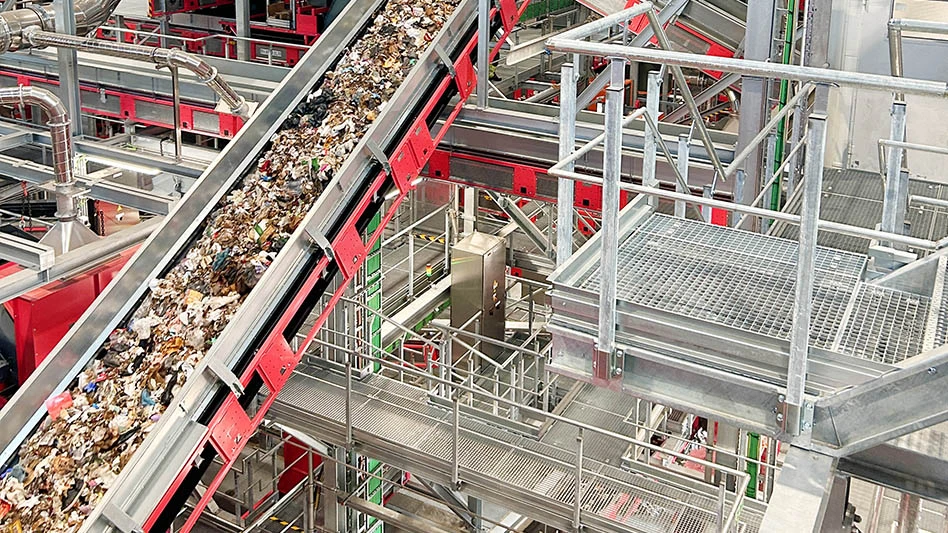
Kzenon | stock.adobe.com
New York City has completed its rollout of weekly compost collection services across its five boroughs.
The program, which began in Queens in the fall of 2022 and expanded to Brooklyn in the fall of 2023, is now permanent and offered citywide.
“It’s simple, when food scraps end up in black bags on the street, they become rat food or methane emissions,” New York City Mayor Eric Adams says. “Starting today, curbside composting is free and pain-free on every block and in every borough."
Curbside composting programs have existed in New York for the last decade, but none have served more than approximately 40 percent of residents, the city reports. Comparatively, the city says this new program is less restrictive on material and bin-type and does not require sign-up.
“[It] is a model that can work for all New Yorkers,” the city says in a news release. “Every New Yorker can now simply take anything from their kitchen or their garden, [including] all food scraps, yard waste and food-soiled paper, and set it out for collection in either a DSNY brown bin or their own labeled, lidded bin of 55 gallons or less.”
Residents have the option to line the bin with a clear bag or not. Compostable materials will be collected the same day as metal, glass, plastic and paper recycling.
“This administration has achieved the long-standing goal of bringing composting to every corner of the five boroughs,” New York City Department of Sanitation (DSNY) Commissioner Jessica Tisch says. “Not as a niche program, but as a free, universal, easy-to-use service. One that will divert record amounts of material from landfills. We’re protecting the environment, fighting rats and bringing equity to the city at large.”
According to the city, New York’s new composting program has been effective since its launch in Queens. The Fiscal Year 2024 Mayor’s Management Report showed a 65 percent increase in compostable material diverted from landfills over the prior two years, and the overall diversion rate has increased for the last three consecutive years.
In addition, 400 Smart Composting Bins are available to use across New York, featuring 24-hour drop-off sites accepting food scraps and yard waste. New York public schools now offer composting collection as well.
The city says material collected through these programs is either converted to renewable energy to heat homes or turned into compost, which is sold to landscapers or given to residents. The DSNY Staten Island Compost Facility has produced approximately 40 million pounds of finished compost per year for the last decade and recently completed an expansion to increase its processing capacity.
Per local law passed by the city council, participation in this program becomes mandatory in each borough when service starts, but fines cannot be written until April 2025. The fine structure is the same as the existing requirements for the separation of recyclables from waste, which starts at $25 for properties with one to eight residential units and $100 for properties with nine or more residential units.
DSNY is engaging in an outreach effort to inform residents of the upcoming mandate and says it has sent mailings to covered residents, met with community boards and civic associations and knocked on the doors of buildings with fewer than 10 residential units in the Bronx, Staten Island and Manhattan. The city previously contacted those in Queens and Brooklyn.
While this program is for residential waste only, New York City’s commercial waste zone program will also increase commercial diversion of compostable material. Under this program, businesses will pay their private waste hauler less to remove compostable material than they do to remove waste.
“A citywide curbside organics collection program is vital to creating a true circular economy in New York City,” says Rohit T. Aggarwala, New York chief climate officer and New York Department of Environmental Protection (DEP) commissioner. “Instead of simply discarding our organic waste, we are recovering energy and nutrients from this material at facilities like DEP’s Newtown Creek Wastewater Resource Recovery Facility and DSNY’s Staten Island Compost Facility.”
Latest from Waste Today
- US Senate backs reduced cuts to EPA
- ELV Select Equipment, Reworld aid NYPD in secure firearm disposal
- Waste Connections announces Q2 results
- Returnity and Cosmoprof to address reusable bag waste
- SWANA releases report on aging WTE facilities
- New economic assessment reveals cost benefits of California’s SB 54
- Premier Truck Sales & Rental opens new facility
- TeknTrash Robotics, Sharp Group partner on humanoid robot pilot





